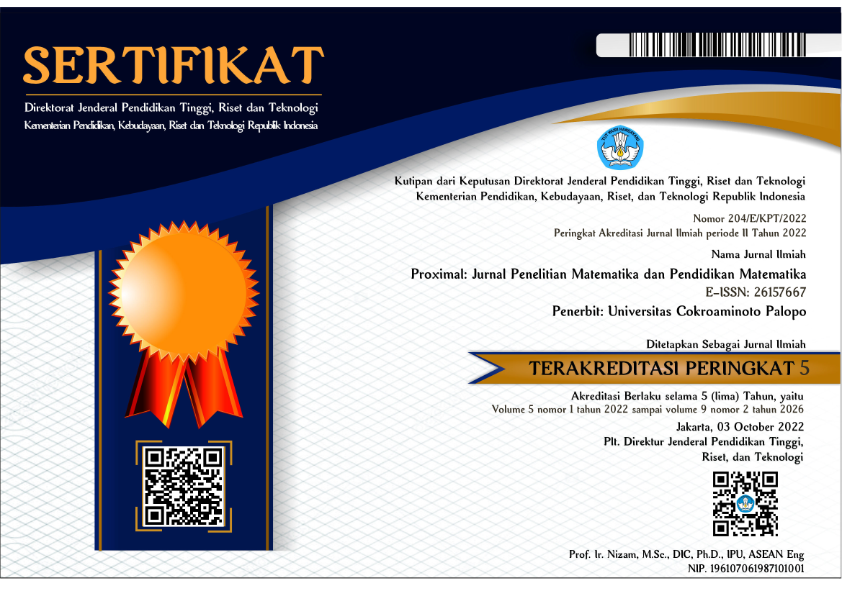PEMBELAJARAN MATEMATIKA BERBASIS MASALAH UNTUK MENINGKATKAN KEMAMPUAN PENALARAN MATEMATIKA DAN MOTIVASI BELAJAR SISWA KELAS IV SD
DOI:
https://doi.org/10.30605/proximal.v5i1.1375Keywords:
Kemampuan penalaran matematika, motivasi belajar, pembelajaran berbasis masalahAbstract
Abstrak. Penelitian ini bertujuan untuk mengetahui apakah terdapat peningkatan kemampuan penalaran matematika dan motivasi belajar siswa kelas IV SD Negeri 239 Salu Minanga kecamatan Malili setelah penerapan model pembelajaran matematika berbasis masalah. Penelitian ini merupakan penelitian kuantitatif dengan pendekatan eksperimen semu. Penelitian ini dilaksanakan di SD Negeri 239 Salu Minanga Kecamatan Malili pada tanggal 24 Mei – 18 juni 2021 . Satuan eskperimen yaitu siswa kelas IV SD Negeri 239 Salu Minanga Kecamatan Malili sewbanyak 36 siswa . Perlakuan yang diberikan adalah pembelajaran matematika berbasis masalah. Instrumen penelitian ini adalah tes penalaran matematika, dan angket motivasi belajar. Data yang diperoleh pada penelitian ini dianalisis secara deskritif dan inferensial. Hasil penelitian ini yaitu 1) terdapat peningkatan kemampuan penalaran matematika siswa kelas IV SD Negeri 239 Salu Minanga kecamatan Malili setelah penerapan pembelajaran matematika berbasis masalah. 2) terdapat peningkatan motivasi belajar siswa kelas IV SD Negeri 239 Salu Minanga kecamatan Malili setelah penerapan pembelajaran matematika berbasis masalah.Downloads
References
Arends, R. I. (2008). Learning to Teach. Yogyakarta: Pustaka Pelajar.
Casnan, C., Mahpudin, A., & Fuadi, E. F. W. (2017). Perancangan Permainan Interaktif “Geocaching” Sebagai Inovasi Baru Pembelajaran Matematika. Edusentris, 4(2), 99-105.
Depdiknas, (2006). Kurikulum Tingkat Satuan Pendidikan. Jakarta: Depdiknas
Herman, T. (2007). Pembelajaran Berbasis Masalah untuk Meningkatkan Kemampuan Penalaran Matematis Siswa SMP. Cakrawala Pendidikan, 1(1), 41-62
Ma'rufi, Pasandaran, R. F., & Yogi, A. (2018). Pemahaman Konsep Geometri Mahasiswa Berdasarkan Gaya Kognitif Mahasiswa. Proximal Jurnal Penelitian Matematika dan Pendidikan Matematika 2(1), 56-67.
Mikrayanti, M. (2016). Meningkatkan kemampuan penalaran matematis melalui pembelajaran berbasis masalah. Suska Journal of Mathematics Education, 2(2), 97-102.
Mullis, I. V. S., Martin, M. O., Foy, P., & Hooper, M. (2016). Appendix F: The Test-Curriculum Matching Analysis–Mathematics. In TIMSS 2015 International Results in Mathematics. Retrieved from http://timssandpirls.bc.edu/timss2015/international-results/timss-2015/mathematics/appendices.
Periandani, P. P., & Gita, I. N. (2019). Penerapan Model Pembelajaran Berbasis Masalah Untuk Meningkatkan Motivasi Dan Prestasi Belajar Matematika Siswa Kelas Viii B Smp N 7 Singaraja. Jurnal Pendidikan dan Pembelajaran Matematika Indonesia, 8(2), 93-101.
Pradnyana, P. B., Marhaeni, A. A. I. N., & Made, C. I. (2013). Pengaruh Pembelajaran Berbasis Masalah Terhadap Motivasi Belajar dan Prestasi Belajar Matematika Siswa kelas IV SD (Doctoral dissertation, Ganesha University of Education).
Sofyan, H., & Komariah, K. (2016). Pembelajaran Problem Based Learning dalam Implementasi Kurikulum 2013 di SMK. Jurnal Pendidikan Vokasi, 6(3), 260-271.
Sumartini, T. S. (2015). Peningkatan kemampuan penalaran matematis siswa melalui pembelajaran berbasis masalah. Mosharafa: Jurnal Pendidikan Matematika, 4(1), 1-10.
Usniati, M. (2011). Meningkatkan Kemampuan Penalaran Matematika Melalui Pendekatan Pemecahan Masalah. Tangerang. UIN Syarif Hidayatulloh.
Downloads
Published
How to Cite
Issue
Section
License
In submitting the manuscript to the journal, the authors certify that:
- They are authorized by their co-authors to enter into these arrangements.
- The work described has not been formally published before, except in the form of an abstract or as part of a published lecture, review, thesis, or overlay journal.
- That it is not under consideration for publication elsewhere,
- That its publication has been approved by all the author(s) and by the responsible authorities – tacitly or explicitly – of the institutes where the work has been carried out.
- They secure the right to reproduce any material that has already been published or copyrighted elsewhere.
- They agree to the following license and copyright agreement.
License and Copyright Agreement
Authors who publish with this journal agree to the following terms:
- Authors retain copyright and grant the journal right of first publication with the work simultaneously licensed under Creative Commons Attribution License (CC BY 4.0) that allows others to share the work with an acknowledgment of the work's authorship and initial publication in this journal.
- Authors are able to enter into separate, additional contractual arrangements for the non-exclusive distribution of the journal's published version of the work (e.g., post it to an institutional repository or publish it in a book), with an acknowledgment of its initial publication in this journal.
- Authors are permitted and encouraged to post their work online (e.g., in institutional repositories or on their website) prior to and during the submission process, as it can lead to productive exchanges, as well as earlier and greater citation of published work.















